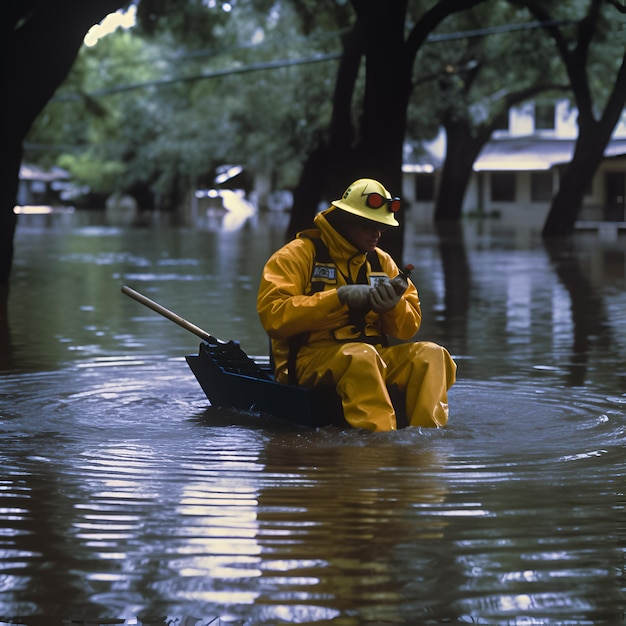Discovering Fascinating Facts About Floods

Floods are one of the most common natural disasters on Earth.
The world’s largest river basin, the Amazon basin, experiences floods every year.
Flash floods are the most dangerous type of floods and can occur within minutes.
Floodwaters can reach speeds of up to 40 miles per hour.
The deadliest flood in history occurred in China in 1931, resulting in the deaths of approximately 4 million people.
Floods can cause extensive damage to infrastructure, including roads, bridges, and buildings.
The majority of flood-related deaths occur due to people attempting to drive through floodwaters.
Floods can transport large amounts of sediment, depositing it elsewhere and altering the landscape.
Floods play a crucial role in replenishing groundwater reserves and sustaining ecosystems.
The Netherlands is known for its advanced flood control systems, including extensive networks of dikes and flood barriers.
Many ancient civilizations, such as the Egyptians, relied on annual floods to provide fertile soil for agriculture.
The terms 100-year flood and 500-year flood refer to floods with a statistical probability of occurring once every 100 or 500 years.
Flooding can lead to the spread of waterborne diseases, such as cholera and dysentery.
Underground parking garages are particularly susceptible to flooding during heavy rainstorms.
The costliest flood in modern history occurred in Thailand in 2011, with damages estimated at $45 billion.
Discovering Fascinating Facts About Floods part 2
Floods can displace millions of people from their homes, leading to long-term economic and social impacts.
Floods can release large amounts of carbon dioxide stored in wetlands, contributing to climate change.
Several U.S. states, including Louisiana and Florida, are prone to hurricanes and subsequent flooding.
Flash floods can turn dry riverbeds, known as arroyos, into raging torrents of water.
Floods can trigger landslides, further exacerbating the destruction and loss of life.
Floods have the potential to contaminate drinking water supplies, leading to shortages and health risks.
The Great Mississippi Flood of 1927 affected 27,000 square miles and displaced hundreds of thousands of people.
In 2005, Hurricane Katrina caused severe flooding in New Orleans, resulting in significant loss of life and property.
Floods can cause significant disruptions in transportation systems, leading to economic losses.
The construction of reservoirs and dams can help regulate water flow and decrease the severity of floods.
The term flash flood alley refers to an area in central Texas prone to frequent and intense flash floods.
Floods can erode riverbanks over time, changing the course of rivers and altering landscapes.
The deadliest flood in U.S. history occurred in 1889 in Johnstown, Pennsylvania, killing more than 2,200 people.
Many urban areas are at greater risk of flooding due to the increase in impermeable surfaces, such as pavement and buildings.
Floods can cause sewage systems to overflow, resulting in the contamination of water sources.
The U.S. Federal Emergency Management Agency (FEMA) provides assistance and resources to communities affected by floods.
Floods can unearth previously buried artifacts and fossils, providing valuable insights into the past.
The excessive deforestation of river basins can increase the risk and severity of floods.
Floods can lead to power outages as electrical infrastructure becomes submerged in water.
Floods can cause significant damage to agricultural crops, leading to food shortages and increased prices.
The ancient city of Venice, Italy, experiences periodic flooding due to high tides and land subsidence.
Floods can have long-lasting impacts on mental health, resulting in increased rates of anxiety and post-traumatic stress disorder.
The largest dam in the world, the Three Gorges Dam in China, was constructed to control flooding on the Yangtze River.
Floods can cause the release of hazardous materials and toxins, posing a threat to human and environmental health.
Floods can create breeding grounds for mosquitoes, increasing the risk of mosquito-borne diseases, such as malaria and dengue fever.
Floods can cause erosion of coastal areas, leading to the loss of beaches and coastal habitats.
The Red River, flowing between the United States and Canada, is prone to severe flooding due to its extensive watershed and flat terrain.
Floods can damage cultural heritage sites, destroying irreplaceable artifacts and buildings.
Climate change is projected to increase the frequency and intensity of floods in many regions of the world.
Community preparedness and early warning systems are crucial in reducing the impact of floods and saving lives.
